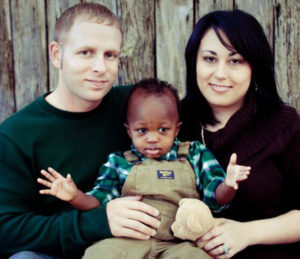 Dear Mardie,
Dear Mardie,
Recently, I heard an interview with Olympic Gymnast Simone Biles, discussing her adoption. (Simone was legally adopted by her birth grandparents after her birth mother lost custody of she and her sister due to drug use.) The host seemed to be getting confused about who was who, and even at the end said “Your grandfather must be so proud,” but that is also her father!?! I guess I’m just feeling that many people don’t see adoptive families as real families. Are they?
First and foremost, YES, adoptive families are real families. For Ms. Biles’ case, it may have had additional confusion because of the biological aspect that kinship adoption has. (Kinship adoption is when a child is adopted by a biological relative – so in this case, Ms. Biles’ legal parents are also her birth grandparents. Confusing indeed!)
Be assured, adoption legally creates real families, so much so that we can see the roots of adoption in the ancient world Biblically! In fact, many people wonder if adoption is also Biblical. Surprisingly, the Bible has a lot to say about adoption and actually helps clarify some of the “realness” issues. Let’s take a look at God’s view of a family unit and His plan for children:
Adoption is legal (and Biblical)
Yes, we all know that there are several laws and regulations in most countries that make adoption legal. But, adoption existed in Biblical times as a legal option. According to the Word of God, the adopted child enjoyed the privilege of becoming a legitimate heir to the father’s estate and was treated as one among the family. The adopted child was treated as someone ‘born into’ the new family and as someone who has just started a new life!
There are many examples of adoption in the Bible: Esther’s adoption by her cousin Mordecai, Moses’ adoption by Pharaoh’s daughter, and Joseph’s acceptance of Jesus as his son. God even adopted the entire tribe of Levi as His own. The Bible indicates that there is no difference in the roles and responsibilities of parents and children, whether the child is biological or adopted. Adoptive families are ‘real’ families in the eyes of God and in the eyes of law.
The realities of adoption
Children brought into families through adoption are no different legally than a biological child. However, the relationship and similarities that develop are typically nothing short of miraculous. In my own adoption, my son couldn’t look more different from me – he’s over 6 feet tall, very slender, and quite fair. Yet the traits we have in common are astonishing – similar personalities, habits, laughs, and even just a spirit of kindness towards “the least of these”. These traits are even some that I don’t share with many of my biological relatives! When I look at him, I know deep in my soul that God intended us for each other.
Spiritual significance of adoption
All believers are children of God and they are heirs through adoption (Rom. 8:15–17, 23; Gal. 4:4–7). This makes each of us a part of God’s adoptive family. God uses adoption as a beautiful metaphor to describe His relationship with those who believe in Him and His resurrection. This gives us the privilege of calling Him “Abba”, which is Aramaic for Daddy and is a Jewish expression of the closeness of children with their fathers. In other words, a Christian’s identity is this: I am adopted by God (Eph 1:5). As believers, we enjoy the rights, privileges, inheritance of biological children. This is by the law of grace.
Do people get confused about adoption? Yes, as evidenced by the interview you saw with Ms. Biles. However confusion happens each day – has anyone ever asked if your mother was your sister? Or if your sister was your daughter? Adoption creates legal and spiritual families, which are completely real in the eyes of the law and the eyes of God.
